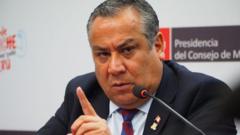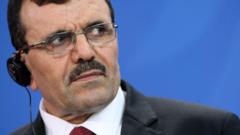A bitter conflict among the children of Singapore's founding leader Lee Kuan Yew centers around a colonial-era bungalow, revealing tensions about political accountability and family legacy within the Lee dynasty.
A Family Divided: The Lee Dynasty's Battle Over Heritage and Power

A Family Divided: The Lee Dynasty's Battle Over Heritage and Power
The feud within Singapore's first family exposes deep-seated issues relating to governance and legacy.
The bungalow, an old colonial house, has become a focal point of contention among the children of Singapore's founding father, Lee Kuan Yew. Once a symbol of his legacy, the house now reflects deep personal and political divides within the family. Lee Hsien Yang, the youngest son, claims that he fled to the UK following a feud with his elder brother, former Prime Minister Lee Hsien Loong, regarding their father's will.
Drawing from both personal interviews with family members and an extensive review of their communications, the story unravels the complexities surrounding the fate of the historic property. Lee Kuan Yew, who led Singapore through its rise to prosperity, expressed in his will a desire to have the house demolished posthumously. However, the ambiguity in his wishes left the family at odds: while the eldest son saw room for interpretation, his siblings sought to honor their father’s intent to prevent public access to his private life.
The brothers’ conflict over the bungalow highlights broader societal concerns in Singapore, specifically the evolving approach to governance in a semi-authoritarian state. Lee Hsien Yang criticizes the reliance on an individual’s benevolence for governance, insisting on accountability in the political system. This family dispute, steeped in historical significance, raises pertinent questions about how legacy and power intersect within Singapore’s contemporary political framework.
Ultimately, what began as a familial disagreement over property has morphed into a larger debate about legacy, accountability, and the future governance of a nation deeply shaped by one man's vision. As these personal battles unfold publicly, they serve as a reminder of the intertwined nature of family and politics, echoing through the heart of Singapore.
Drawing from both personal interviews with family members and an extensive review of their communications, the story unravels the complexities surrounding the fate of the historic property. Lee Kuan Yew, who led Singapore through its rise to prosperity, expressed in his will a desire to have the house demolished posthumously. However, the ambiguity in his wishes left the family at odds: while the eldest son saw room for interpretation, his siblings sought to honor their father’s intent to prevent public access to his private life.
The brothers’ conflict over the bungalow highlights broader societal concerns in Singapore, specifically the evolving approach to governance in a semi-authoritarian state. Lee Hsien Yang criticizes the reliance on an individual’s benevolence for governance, insisting on accountability in the political system. This family dispute, steeped in historical significance, raises pertinent questions about how legacy and power intersect within Singapore’s contemporary political framework.
Ultimately, what began as a familial disagreement over property has morphed into a larger debate about legacy, accountability, and the future governance of a nation deeply shaped by one man's vision. As these personal battles unfold publicly, they serve as a reminder of the intertwined nature of family and politics, echoing through the heart of Singapore.



















